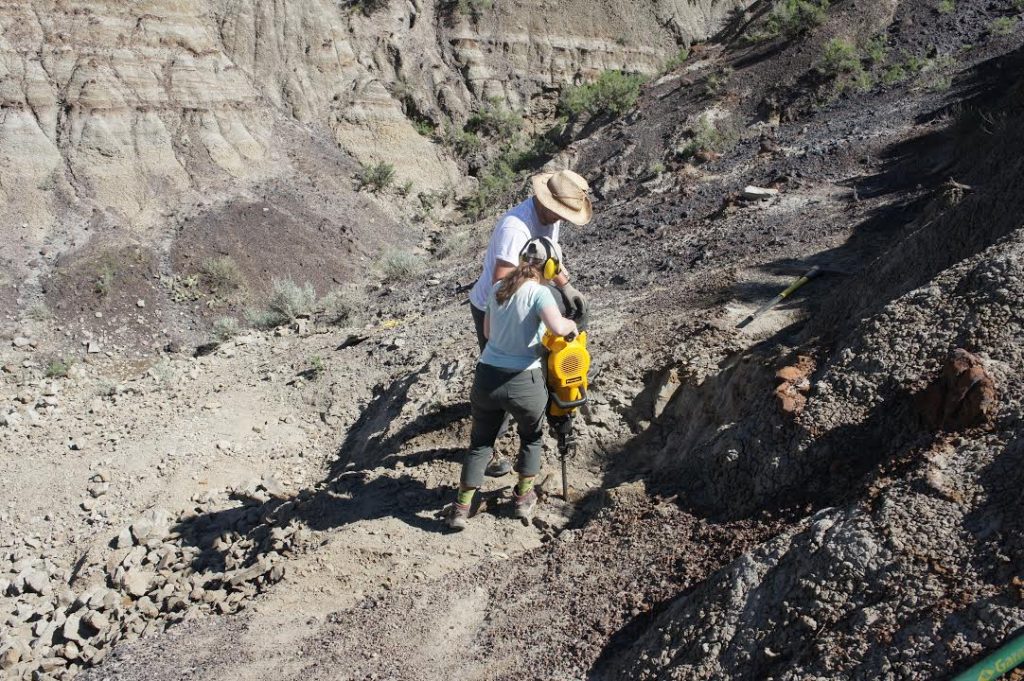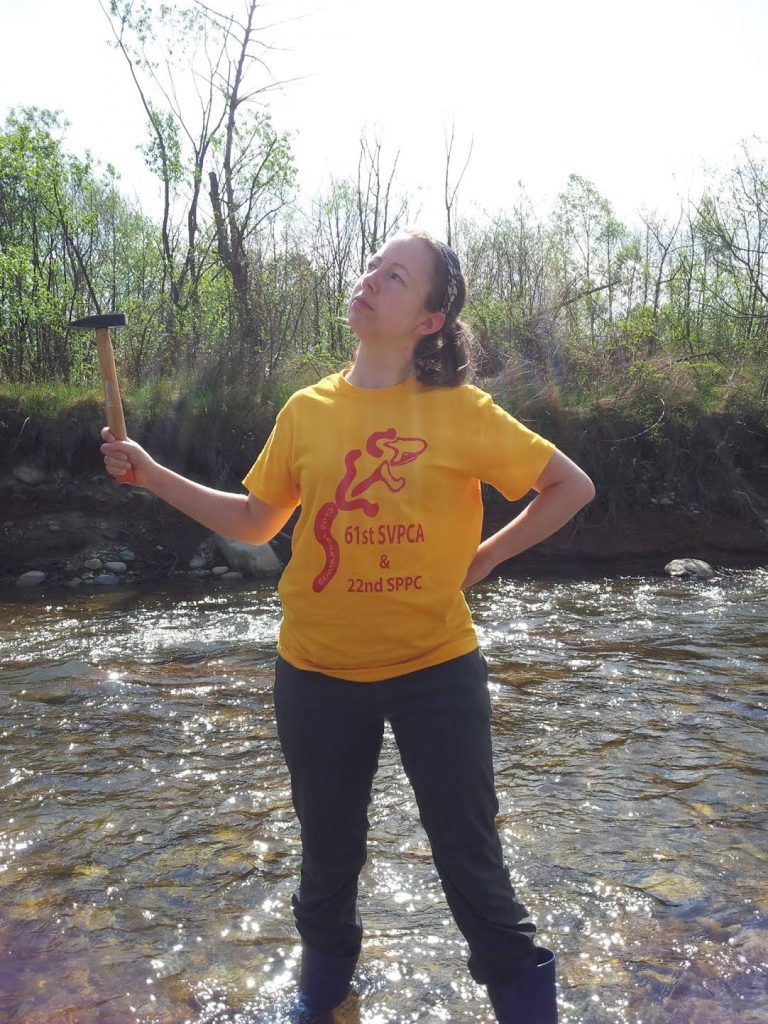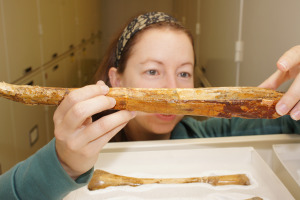Sri Ray-Chauduri and Kathi Unglert, Environment & Earth Sciences editors
After our Science Borealis Reader Survey, we randomly selected four participating blogs to be profiled here on the Borealis Blog during 2016. This is the third of those featured posts.
Today we’re talking with Liz Martin-Silverstone, who runs one of our feature blogs, ‘Musings of a Clumsy Palaeontologist’ and contributes to the palaeontology podcasting site Palaeocast. Because we had such a great time chatting we got a bit carried away, so the interview has been edited for clarity and length.
Kathi: Welcome, Liz! We’re very interested in what you have to say about your blog and your science communication life. Please introduce yourself and your blog.
Liz: I’m a PhD student at the University of Southampton working in palaeontology. I started my blog during my master’s when there was a large discussion about the legality of selling fossils. In particular, one big specimen from Mongolia went on auction, and there was a big fuss about whether they could legally put it on auction, because it’s illegal to export Mongolian fossils.
So I started my blog on that topic, and whether it was OK to do it and the problem with selling fossils. People enjoyed the posts, so I thought, ‘Maybe I’ll keep doing this!’ I generally like to blog about things interesting to me at the time, whether it’s a recent paper or some topic I’ve seen constantly misrepresented in the media (laughs), and try not to talk too much about what other people are talking about, because that tends to irritate me (laughs again –we love her already).
Kathi: Would you like to tell us a bit about your podcast ‘Palaeocast’, and how it ties in with your blog and the topics you blog about?
Liz: Palaeocast is an educational palaeontology podcast I do with a group of PhD students and postdocs. We try not to make it too specialized. We interview scientists, usually academics but sometimes others like palaeo artists, on general paleao topics. It’s something I really enjoy. For example, if there is a really interesting paper that’s just come out, you can get the author to talk about it and describe why it’s interesting, and what they exactly did. I sometimes share similar topics on my blog, but I try to keep it more specifically related to my research, or things that I think are particularly interesting, rather than just general palaeontology topics.
Kathi & Sri: Do you think the target audiences of your blog and the podcast are the same? Do you have a sense of your readership?
Liz: Yes, the target audience is generally the same, although my blog might be a bit more academic-based. The general idea is the same though, which is to get the public more interested in palaeontology. For me especially, I think palaeontology is a unique science because people love it – they love dinosaurs, they love fossils, and they love palaeontology – but they often have no idea what the actual science behind palaeontology is. They often don’t realise things like birds are dinosaurs, or pterosaurs (which are extinct flying reptiles) are not dinosaurs, or these animals had feathers and these other ones didn’t. So I think it’s important to talk about scientific advances and what we’re learning. Dinosaurs are not just scary reptilian things, but they’re quite diverse and interesting, so that’s what we do with Palaeocast.
With Palaeocast it’s quite easy to get a sense of audience, because we have a pretty active fan base. We have 3,000 followers on Twitter and Facebook, and it tends to be non-academics who are sharing our content. A lot of academics do know about it though, and we’ve been approached by people saying, ‘I love Palaeocast, if you ever want to interview me let me know!’

“My colleague had to spot me and make sure I didn’t die because it was so heavy!” — Liz on learning how to use a jackhammer at a Southern Alberta dig site near Dinosaur Provincial Park.
Sri: Are there any topics you stay away from?
Liz: The only thing that I wouldn’t blog about is religion and palaeontology. The other day I wrote an article for The Conversation, which is kind of a news website with articles written by academics. I got an email shortly after that post from somebody from a religious institution in the States asking me about the flood and various things. In many cases like this there is no point in engaging.
Kathi: Is there something that you feel science communication could do better to convey scientific findings?
Liz: Yes. A lot of times when I read a news article on some new scientific find, especially in palaeontology, I can pick out a mistake within the first three sentences. Many times it’s very basic, like getting the time that an animal evolved wrong. Sometimes it would be beneficial if one had a bit more background before writing for a newspaper, for example. Or at least put in the time to read about it, and check things, like with the person whose story you’re writing.
Sri: What suggestions or advice do you have for somebody in science interested in getting more involved with science communication? How should they start?
Liz: Start with something that you’re interested in. If you write about things that you’re passionate about it’s more likely to come across in your writing, and that way it’ll be much more interesting. If you try to write something just for the sake of writing it, then it’s probably not going to come out great on paper. Some people say that blogging is dying, but I think there is still room for people to continue blogging, so if you have something interesting to say just give it a go!
The other thing ÂÂÂÂis don’t give up if after two weeks you have the feeling nobody is reading it, because it takes time to get followers. So stick with it, and although it can be hard, try to post frequently!

Liz holding the tool of the trade, the `geology hammer’ in Pui, Romania on the Barbat River. Liz and her colleagues spent hours in the river looking for fossils and she notes this type of field work can be “very cold and slightly treacherous at times.”
Sri: Do you think you’ll always blog, even if your career path changes?
Liz: I’d like to: I’ve found that in the UK it’s a lot more common for people in academia to blog and be active in science communication than, say, in Canada. I think that’s really awesome. It’s been great to communicate with academics through Twitter, through reading their blogs, and being able to see what their groups are up to.
When I went to my first big conference, there were several people that I met that I had talked to on Twitter. That made it just so much easier to go up to them and talk to them. It was much more natural than just walking up to some big professor you’ve never met before. Maybe scientific writing in general is also something I could get paid for, if the academic route doesn’t work (laughs). I do really enjoy it!
*Header Image: Liz examining pterosaur fossils in the American Museum of Natural History collections.
** All photos used with permission.




